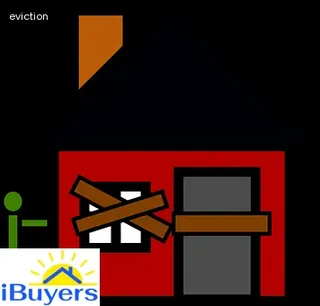An eviction notice is a legal document that serves as formal notification from a landlord or property owner to a tenant of their intention to terminate the rental agreement. An eviction notice includes important details such as the amount of rent past due, the amount allowed for payment to prevent eviction and any other conditions that must be met by the tenant in order to avoid being evicted.
If a tenant fails to meet these conditions, then the landlord may file an eviction lawsuit with their local court. The eviction notice is an essential part of the process, as it provides tenants with legal protection and allows them time to make arrangements before they are officially evicted.
Eviction notices vary by state, so it is important for tenants to understand the specifics of their own state's law regarding this issue.

It is important for both tenants and landlords to understand the eviction process and the laws that govern it. Every state has different landlord-tenant laws, so it is vital for both parties to review their local regulations carefully.
Landlords are required to follow a specific legal procedure in order to evict a tenant, which includes issuing a notice of eviction and providing sufficient time for the tenant to either pay rent or vacate the premises. Additionally, landlords must have a valid reason for evicting a tenant such as nonpayment of rent or lease violations.
Tenants should also be aware of their rights which may include filing an appeal if they believe they have been wrongfully evicted. In any case, understanding landlord-tenant laws can help both parties navigate through the eviction process more efficiently and reduce potential conflicts.
When it comes to the eviction process, one of the most important steps is gathering all of the necessary documentation.
Depending on local laws and regulations, landlords typically need to provide a written notice which specifies the amount of money owed and how much time the tenant has to pay before eviction proceedings can begin.
Other documents that may be required for an eviction include proof of ownership of the property, a copy of the lease agreement, court documents indicating that all legal requirements have been met, and any other relevant paperwork.
It is important that landlords have all of these documents in order before they can move forward with filing an eviction case against tenants.

Eviction is a costly process for both landlord and tenant and often involves a variety of fees. Depending on the state, court filing fees for eviction proceedings can range from $50 - $400 or more.
In addition to the filing fee, landlords may also be required to pay for service of process, which is the delivery of legal documents to the tenant. This cost can range from $25 - $100 per attempt depending on the county or jurisdiction.
Depending on the situation, landlords may also be responsible for covering miscellaneous fees associated with eviction such as attorney costs, late payment charges, and even damages that exceed security deposits. It's important to understand all of these costs when considering whether to pursue an eviction action against a tenant.
Preparing for a court hearing for eviction can be a daunting task, especially when it comes to understanding the full scope of the process. It's important to familiarize yourself with the local laws and regulations surrounding eviction cases, as well as the procedures that tenants and landlords must follow.
In addition, familiarizing yourself with the various forms associated with an eviction case is key to ensuring that you are ready for your court hearing. It is also essential to understand how long it takes for an eviction case to be resolved; this will help you plan accordingly in terms of budgeting and scheduling.
Furthermore, it's important to make sure that you have all of your documentation prepared and organized before appearing in court, such as leases, proof of income or financial hardship, receipts from rent payments or other fees, and any other evidence you may need to present.

When it comes to eviction, landlords have the right to remove tenants for violating the terms of their lease or for not paying rent. Depending on the state and local laws, tenants may be able to remain in the property for a certain amount of time after an eviction notice is served.
In some states, such as California and New York, landlords must follow specific guidelines when evicting tenants, including providing a written notice with details about why they are being evicted. The timeframe varies from one state to another, but typically ranges from 30 days to six months.
Once an eviction is filed in court, it can take anywhere from two weeks to several months before the tenant is actually removed from the property. Depending on the circumstances of the case and how quickly all parties respond to communications and attend court hearings, it can take much longer than expected for a landlord to successfully evict a tenant.
The traditional eviction process can be lengthy and complex, often leaving tenants feeling powerless and frustrated. Fortunately, there are alternatives to the standard eviction process for landlords and tenants to consider.
Mediation is one such option, which allows both parties to come together to discuss and negotiate an agreement that works for everyone. This approach can help resolve disputes quickly, without having to go through a long legal battle in court.
Additionally, some states offer rent arbitration programs that allow landlords and tenants to present their cases before a neutral third-party mediator who will then make a binding decision on the matter. Finally, it's important to note that many cities have adopted laws that provide additional protection for tenants by requiring landlords to give written notice ahead of time before filing an eviction action in court.
By exploring all of these options, it's possible for landlords and tenants alike to find a solution that works best for them without having to go through the long, drawn-out traditional eviction process.

After an eviction hearing, landlords must quickly move on to collecting payment. For this to happen, they must first write up a judgement of possession and have it delivered to the tenant.
The tenant then has a certain amount of time, depending on state laws, to pay their debt or leave the property. If they choose not to pay or move out within that time frame, the landlord may ask the local court clerk for a writ of possession.
This document will allow an officer of the law to physically remove the tenant from the property if necessary and return it back to the landlord. It is important for landlords to keep track of deadlines during this process as some states may require additional paperwork in order for them to reclaim their property.
If a landlord does not act promptly, they could miss out on collecting any money owed from their tenants.
Attorneys play an invaluable role in the eviction process, as they are the ones who represent landlords and tenants involved in disputes. Attorneys can provide legal advice to both sides and can help landlords navigate complex state laws surrounding eviction.
They review documents, draft pleadings, and advise on proper procedures for filing an eviction notice. They also work to ensure that a landlord is following all applicable regulations when it comes to evicting someone from their property.
An attorney may also represent a tenant if they feel their rights have been violated during the eviction process. In addition to providing legal representation, attorneys may be called upon to mediate conflicts between landlords and tenants or provide guidance on how to find other housing options for a tenant.
Ultimately, attorneys play an important part in helping to expedite the eviction process and ensuring that it is conducted fairly and properly.

As a landlord, it is important to understand your rights during an eviction. During this process, you are legally allowed to take the necessary steps to protect and secure your property.
Additionally, you may be able to pursue legal action against the tenant in court if they fail to comply with their lease terms. You also have the right to enter into negotiations with the tenant in hopes of coming up with an agreement that works for both of you.
Furthermore, you have the right to present evidence in court if needed and can even appeal a decision if it doesn't go your way. It's important to remember that throughout the entire eviction process, you should remain respectful of your tenant's rights while protecting your own interests as well.
Before filing an eviction notice, it is essential to consider a few important factors. Primarily, the landlord must ensure they are familiar with the local laws and regulations governing evictions in their state.
In many cases, landlords must provide tenants with written notices of the eviction process, including details about how long the tenant has to leave the property. Additionally, landlords should be aware of any required paperwork that needs to be filled out and submitted to the court system.
It is also important for landlords to understand if there are any legal obligations that need to be fulfilled before beginning an eviction. Furthermore, understanding any potential financial or other consequences of evicting a tenant can help landlords make informed decisions when considering this action.

The typical timeline for completing an eviction process can vary depending on the specifics of a case. Generally, the process begins when a landlord serves the tenant with an eviction notice, usually due to non-payment of rent or other violations of the rental agreement.
The tenant will then have a certain amount of time to respond to the notice, typically 5 days in most states. If they do not take action within that time frame, the landlord can file an unlawful detainer lawsuit in court.
After filing, it typically takes 2-3 weeks before a judge issues a ruling. Depending on whether the tenant chooses to fight or accept the ruling, it can take anywhere from 1-8 weeks for them to vacate the premises.
In some cases, this may involve further court proceedings if there is an appeal by either party. Although it is not always possible to predict how long any particular eviction process will take, understanding this general timeline can help landlords and tenants alike plan accordingly and account for potential delays in resolving their dispute.
Eviction can be a long and complicated process, but understanding the common causes of eviction can help you navigate it. Most commonly, an eviction is triggered by the tenant failing to pay rent on time.
If the tenant is late with payments more than once, the landlord may begin the eviction process. Other common reasons for an eviction include violating other conditions of a rental agreement such as having unauthorized occupants or pets; causing damage to property; creating a health hazard; engaging in criminal activity on the premises; or disturbing other tenants.
Sometimes an eviction is also initiated if a tenant does not comply with local housing laws or ordinances, such as ignoring noise ordinances. In rare cases, evictions occur if the property owner decides to take back possession of their rental unit and gives proper notice to their tenants.

Eviction is a serious matter that can have a significant impact on one's credit score. Unlawful detainers are court orders that landlords use to evict tenants from their properties, and when these orders appear on a credit report, they can have a major negative effect.
The damage to a credit score caused by an unlawful detainer can be substantial, as it is seen by lenders as an indication of financial irresponsibility. Furthermore, the eviction process itself can take several months to complete and will remain on the tenant's record for years afterwards, further impacting their ability to obtain favorable loan terms or rent another property in the future.
In some cases, tenants may even face difficulty in finding employment due to their eviction being listed on their credit report. It is important to understand the impact that an unlawful detainer can have on one's credit score in order to minimize the amount of damage done and make sure that all steps are taken to expedite the eviction process.
When it comes to dealing with tenants who refuse to leave even after an eviction order has been issued, it is important for landlords to understand the legal process for evicting a tenant. Depending on the state or local laws of the area, evictions can take anywhere from a few weeks to several months.
Landlords must first give the tenant a written notice that they are violating their rental agreement and must then file an eviction lawsuit in court. If the tenant still refuses to leave after being served with the eviction notice, a court order will be issued.
It is then up to the landlord, or more accurately their lawyer, to have local law enforcement execute the court order and physically remove the tenant from their rental property. The process of executing an eviction order can be complicated and time consuming, so it is important for landlords to be aware of all of their rights and options under local laws before taking any action against a tenant who refuses to leave.
Evicting a tenant is never a pleasant experience, but it is sometimes necessary. The eviction process can be long and complicated, but there are some steps you can take to speed up the process.
The fastest way to evict a tenant from your property is to use an expedited eviction procedure. This legal procedure allows landlords to evict tenants quickly and efficiently, often within two weeks or less.
By utilizing an expedited eviction procedure, landlords can save time and money while also ensuring their tenants are abiding by the terms of their lease agreement. Additionally, an expedited eviction procedure grants landlords more control over the situation since they do not have to wait for lengthy court proceedings before being able to reclaim their property.
Ultimately, using an expedited eviction procedure is the most efficient way to evict a tenant from your property.